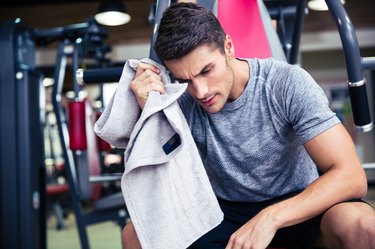
Exercise is beneficial for strengthening the cardiovascular system, and the body typically responds by raising your heart rate, expanding your breathing patterns and increasing how much you sweat. But while these are normal responses to exercise, a sudden spike in heart rate or uncontrollable sweating is not only detrimental, it can be a sign of illness or an underlying disorder.
Sweating
Video of the Day
Excessive sweating during exercise occurs as a response by the body attempting to regulate temperature. When you exercise, your heart beats faster and your muscles generate heat, which raises your internal body temperature. Your body attempts to cool itself by releasing sweat to evaporate off the surface of the skin. Some people sweat excessively during exercise, a condition known as hyperhidrosis. The autonomic nervous system, which controls the sweat glands, becomes overactive and is unable to regulate the amount of perspiration.
Video of the Day
Heart Rate
When you exercise, your heart rate increases to respond to your body's expanded need for oxygen. The heart sends blood to the lungs to receive oxygen and then pushes it toward the rest of the body, including the muscles. For those who exercise regularly, the heart becomes conditioned to meet the oxygen needs, and although the heart rate rises during exercise, it also recovers quickly. If you do not work out regularly, you may experience a spike in heart rate if you suddenly attempt to perform high-intensity exercise.
Arrhythmia
Some heart arrhythmias may cause a sudden spike in heart rate. Tachycardia is a condition in which the heart rate rises to an abnormally fast rhythm, which may be associated with exercise intolerance. The heart is unable to pump blood effectively because it is beating at such a fast rate. You may also experience sweating, as well as dizziness or lightheadedness. If severe, you could become short of breath or lose consciousness. Treatment of tachycardia requires an accurate diagnosis and an understanding of the cause of the condition. Check with your doctor if you experience a sudden, rapid heartbeat or symptoms of palpitations.
Considerations
The maximum heart rate is the fastest time your heart can beat during a minute. You can determine your maximum heart rate by subtracting your age from 220. Although your heart may reach a maximum rate during exercise, you may become exhausted by continuing with such high levels. If your heart rate suddenly spikes because you are not conditioned to regular workouts, it will take longer for your heart to recover to its normal, resting activity. You may also experience excessive sweating because the heart muscle is working at a fast rate and taking longer to slow back to normal.